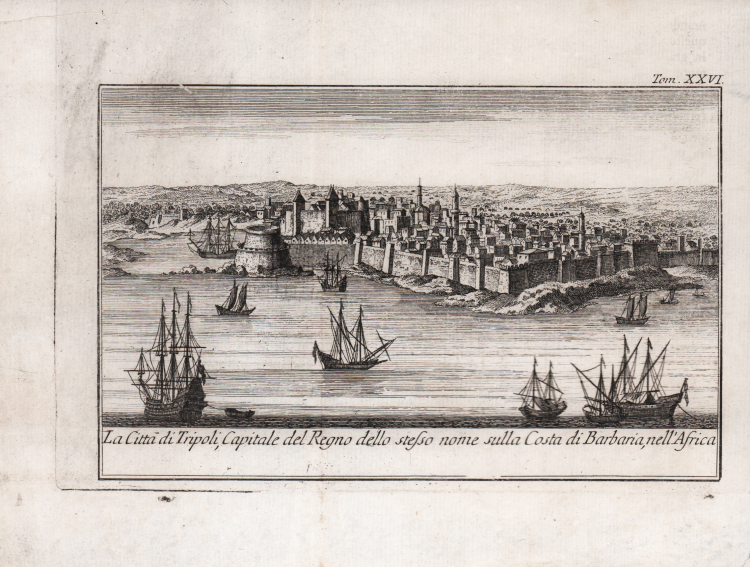



| Reference: | S48037 |
| Author | Giambattista ALBRIZZI |
| Year: | 1740 ca. |
| Zone: | Tripoli |
| Printed: | Venice |
| Measures: | 175 x 125 mm |


| Reference: | S48037 |
| Author | Giambattista ALBRIZZI |
| Year: | 1740 ca. |
| Zone: | Tripoli |
| Printed: | Venice |
| Measures: | 175 x 125 mm |
Plate taken from Lo stato presente di tutti i paesi e popoli del mondo naturale, politico e morale con nuove osservazioni degli antichi e moderni viaggiatori. Scritto in inglese dal signor Salmon. Tradotto in Ollandese, e Francese, Tedescho ed ora in Italiano. In Venezia, Presso Giambattista Albrizzi MDCCXXXVII-MDCCLVI (1737-66).
The work - in twenty-seven volumes - whose original title was Modern history, or the present state of all nations, was translated from English and printed in Venice by Albrizzi in the space of several years; it traces a historical analysis of the nations of the world, enriched by the geographical and artistic description of the cities. Inside there are precious copper engravings that depict the territory, views and monuments.
Commonly the plates are attributed to Salmon because the volumes of Albrizzi are the translation in work that appeared between 1725 and 1739 in London in 32 volumes. However, the maps in the work are the same that Albrizzi used for his Atlante Novissimo, che contiene tutte le parti del mondo from 1740 (volume 1) - 1750 (volume 2), derived from the works of Guillaulme de L'Isle and Iasaak Tirion. The same perspective plans and views contained in Lo stato presente di tutti i paesi e popoli del mondo are also to be assigned to Albrizzi as editor.
The author was particularly proud of this series because this was "the first travel book [...] that has proposed for its purpose the truth and not the wonder. The fortune of the publication was so striking that "when I arrived to publish just the eighth volume, I soon found myself, due to a lucky outcome, without any copies".
Giambattista Albrizzi is part of a family of printers and publishers of Venice from Bergamo. Start of printing was in the last decades of the seventeenth century, Girolamo Albrizzi was succeeded by his son Giambattista, particularly active in the twenty years 1730-50. He gave great impetus to the art printing Venetian, linking its name to a series of magnificent editions, which earned him the collaboration of the best designers and engravers of the time: Piazzetta, Zanetti, Pitteri and Bartolozzi.
Copperplate, in good condition.
Bibliografia
V. Valerio, Cartografi Veneti, p. 139.
Giambattista ALBRIZZI (Venezia 1698 - 1777)
|
Giambattista Albrizzi is part of a family of printers and publishers of Venice from Bergamo. Start of printing was in the last decades of the seventeenth century, Girolamo Albrizzi was succeeded by his son Giambattista, particularly active in the twenty years 1730-50. Among the most ancestors of modern journalism, at the end of 1740 obtained by the Reformers of the University of Padua, the privilege of printing "a newspaper containing news and military policies" entitled The New Postiglione. Gave great impetus to the art printing Venetian, linking its name to a series of magnificent editions, which earned him the collaboration of the best designers and engravers of the time: Piazzetta, Zanetti, Pitteri and Bartolozzi. Lit: Valerio, Cartografi Veneti, p. 139
|
Giambattista ALBRIZZI (Venezia 1698 - 1777)
|
Giambattista Albrizzi is part of a family of printers and publishers of Venice from Bergamo. Start of printing was in the last decades of the seventeenth century, Girolamo Albrizzi was succeeded by his son Giambattista, particularly active in the twenty years 1730-50. Among the most ancestors of modern journalism, at the end of 1740 obtained by the Reformers of the University of Padua, the privilege of printing "a newspaper containing news and military policies" entitled The New Postiglione. Gave great impetus to the art printing Venetian, linking its name to a series of magnificent editions, which earned him the collaboration of the best designers and engravers of the time: Piazzetta, Zanetti, Pitteri and Bartolozzi. Lit: Valerio, Cartografi Veneti, p. 139
|